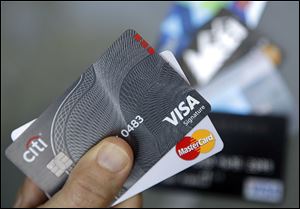
EDITORIAL
Step back from the credit cards
12/26/2017

Credit card debt — among the costliest kinds of debt — has been creeping steadily upward in 2017.
Americans seem to have a short memory for what a load of bad debt can do to their finances when the economy tanks.
Credit card debt — among the costliest kinds of debt — has been creeping steadily upward in 2017. Earlier this year, American consumer credit card debt surpassed the previous record, which was set just before the financial crisis of 2008.
Click here to view more Blade editorials
On average, Americans have a balance of more than $15,000 in credit card debt. And worse than that, we have very little savings stashed away.
Household debt overall is on the rise. But unlike mortgages and car loans, credit card balances carry hefty financing rates. Average annual percentage rates hover around 15 percent.
Also unlike a mortgage or a car loan, credit card debt should be largely avoidable for responsible consumers.
NerdWallet’s American Household Credit Card Debt Study, which analyzed data from the U.S. Federal Reserve Bank and the Census Bureau, shows that half of all Americans carry credit card balances instead of paying them off each month.
The study noted that in some cases, Americans are spending more with credit cards and accumulating balances because the cost of living is outpacing income growth. Without a solid savings, people are forced to use credit to pay medical expenses or even housing costs.
For the most part, though, consumer debt is often driven by consumer lack of willpower.
When the rates charged by credit card companies amount to modern usury, it is crucial that American consumers get a grip on how they are using plastic.
As the country learned in 2008, the economy can be fragile and sometimes just one burst housing bubble away from disaster. Responsible spending and delayed gratification in the form of a decent savings account can fend off at least some of the effects of financial crisis.